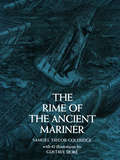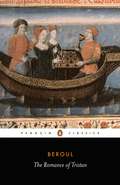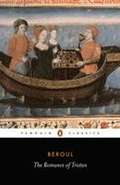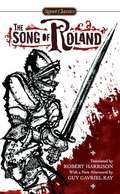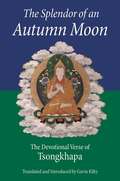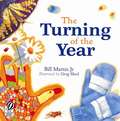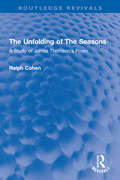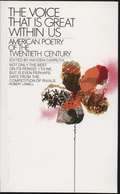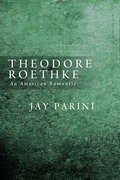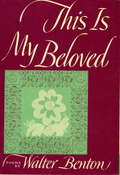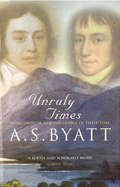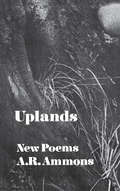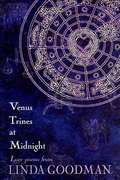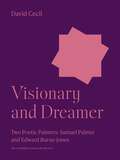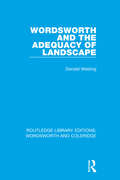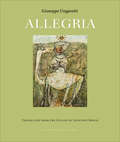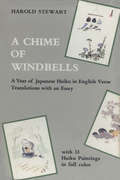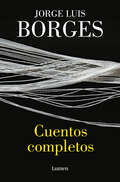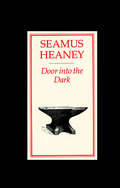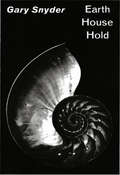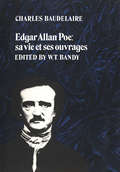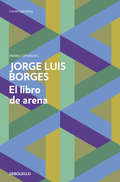- Table View
- List View
The Rime of the Ancient Mariner
by Gustave Doré S. T. ColeridgeGustave Dore's magnificent engravings for The Rime of the Ancient Mariner are among the later works of the great French illustrator. The intensely evocative poem provided Doré with the long-awaited opportunity to convey limitless space on a gigantic scale, and he exploited the poem's fantastic range of atmosphere to the limits of its possibilities. The terrifying space of the open sea, the storms and whirlpools of an unknown ocean, the vast icy caverns of Antarctica, the hot equatorial sea swarming with monsters, all of the amazing visual elements that make Coleridge's masterpiece one of the most exciting and most memorable poems in the English language are unforgettably engraved in Doré's plates.This edition reproduces all of the plates to perfection, in their original size. The illustrations and the text of the poem appear on facing pages, so that the imaginative kinship of Doré and Coleridge is delightfully evident on every page: the illustrations capture all the moods of the poem in their full intensity, bringing the images evoked by the words into clear visual focus. Unabridged and slightly rearranged republication of the 1878 American edition. Text slightly amended to conform to the authoritative 1834 edition of the poem.
The Romance of Tristan: The Tale of Tristan's Madness
by BeroulOne of the earliest extant versions of the Tristan and Yseut story, Beroul's French manuscript of The Romance of Tristan dates back to the middle of the twelfth century. It recounts the legend of Tristan, nephew of King Mark of Cornwall, and the king's Irish wife Yseut, who fall passionately in love after mistakenly drinking a potion. Their illicit romance remains secret for many years, but the relentless suspicion of the king's barons and the fading effects of the magic draught eventually lead to tragedy for the lovers. While Beroul's work emphasizes the impulsive and often brutal behaviour of the characters, its sympathetic depiction of two people struggling against their destiny is one of the most powerful versions of this enduringly popular legend.
The Romance of Tristan: The Tale of Tristan's Madness (Penguin Classics)
by Beroul Alan FedrickOne of the earliest extant versions of the Tristan and Yseut story, Beroul’s French manuscript of The Romance of Tristan dates back to the middle of the twelfth century. It recounts the legend of Tristan, nephew of King Mark of Cornwall, and the king’s Irish wife Yseut, who fall passionately in love after mistakenly drinking a potion. Their illicit romance remains secret for many years, but the relentless suspicion of the king’s barons and the fading effects of the magic draught eventually lead to tragedy for the lovers. While Beroul’s work emphasizes the impulsive and often brutal behaviour of the characters, its sympathetic depiction of two people struggling against their destiny is one of the most powerful versions of this enduringly popular legend.
The Song of Roland
by Robert HarrisonOne of the crowning achievements of medieval artistic genius, The Song of Roland tells the story of the battle of Roncesvals in 778. At the center of this heroic epic is Roland, the supreme embodiment of the chivalric ideal who leads his men into combat and fights valiantly to the death.
The Splendor of an Autumn Moon
by Je Tsongkhapa Gavin Kilty Kilty"Some of the most inspiring verses ever written."--Geshe Thupten Jinpa, PhD, founder, Institute for Tibetan ClassicsThe Tibetan saint Tsongkhapa (1357-1419), the founder of the Dalai Lama's tradition of Tibetan Buddhism, was renowned for his vast learning, meditational achievements, influential writings on practice and philosophy, and reform of tantric religious practices. A deeply humble and religious man, he expressed himself in exquisite verse.Here, presented in both the original Tibetan and in English translation, are twenty-one devotional poems by Tsongkhapa. Each verse--dedicated to the Buddha, bodhisattvas, and lamas--illuminates some aspect of the Buddhist path. Gavin Kilty's commentary places each prayer into context, and his careful, artful translations will appeal to anyone with a love of poetry.
The Turning of the Year
by Billy MartinSledding, splashing, catching fireflies, picking pumpkins--there's always something fun to do outdoors.
The Unfolding of The Seasons: A Study of James Thomson's Poem (Routledge Revivals)
by Ralph CohenFirst published in 1970, The Unfolding of The Seasons provides an interpretation and evaluation of James Thomson’s poem The Seasons. Professor Cohen urges its reconsideration as a major Augustan poem, arguing that Thomson’s unity, diction and thought combine with a conception of man, nature and God which is poetically tenable and distinctive. The case for The Seasons as an important work of art depends upon its effectiveness as a moving vision of human experience, and Professor Cohen believes that many critics have not felt this effectiveness because they have misconceived Thomson’s vision and misunderstood his idiom. His study aims to persuade them to return to the poem and to examine it within the context of an Augustan tradition. Professor Cohen shows that Thomson’s great achievement is to have fashioned a conception which, by bringing nature to the forefront of his poem, became a new poetic way of defining human experience. Thomson was not the first nature poet in English, but he was the first to provide an effective idiom in which science, orthodox religion, natural description, and classical allusions blended to describe the glory, baseness and uncertainty of man’s earthly environment, holding forth the hope of heavenly love and wisdom. This study shows that Thomson found a personal idiom by means of which he created an artistic vision. It will appeal to those with an interest in English literature and in philosophy.
The Voice That Is Great within Us: American Poetry of the Twentieth Century
by Hayden CarruthThis famous anthology includes the works of more than 130 major American poets of the modern period--Robert Frost, Paul Goodman, Carl Sandburg and Gwendolyn Brooks among them--along with short biographies of each.
Theodore Roethke
by Jay PariniJay Parini's biography of the poet, Theodore Roethke. Parini views Roethke through the lens of a Romantic poet. <P><P>With this incredibly researched and well written work, Parini reaffirms Roethke's reputation as a poet that came into his own after the publication of "The Lost Son," and then continued to develop from there and greatly extended his reputation with further works.
This Is My Beloved
by Walter BentonBorn in Austria of Russian parents, Walter Benton lived most of his life in the United States. After working on a farm, in a steel mill, as a window washer, as a salesman, and at various other jobs, he entered Ohio University in 1931, and in due course was graduated. He then spent five years as a social investigator in New York. During the second World War he served in the United States Army, being commissioned a lieutenant of the Signal Corps in the autumn of 1942 and later being promoted to a captaincy. After the war he returned to New York and devoted his time to writing.This Is My Beloved, the remarkable diary in verse that has become one of the most popular books of poetry, was his first published volume, though his work was already familiar to readers of Poetry, Fantasy, the Yale Review, and the New Republic. Never a Greater Need, a second selection of his poems, was issued in 1948. Walter Benton died in 1976.From the Hardcover edition.
Unruly Times: Wordsworth and Coleridge in Their Time
by A S ByattUnruly Times is a superlative portrait of the relationship between Wordsworth and Coleridge, and a fascinating exploration of the Romantic Movement and the dramatic events that shaped it. With a novelist's insight and eye for detail, A. S. Byatt brings alive this tumultuous period and shows a deep understanding of the effects upon the minds of Wordsworth, Coleridge and their contemporaries - de Quincey, Lamb, Hazlitt, Byron and Keats.
Uplands: New Poems
by A. R. AmmonsThis book collects many of the poems that A. R. Ammons wrote between 1964 and 1970. The poems here include brief lyrics and such longer works as "Summer Session 1968" and "Guitar Recicativos." The critic Harold Bloom writes, "With the publication of his Selected Poems (1968), soon after turning forty, A. R. Ammons quietly demonstrated a unique and central position in recent American poetry. . . . Recognition, as is always the case with a poetry difficult and central, has come slowly, but critics now begin to see in Ammons what he is: the maker of a body of poetry that fulfills Emerson's prophecy by addressing itself to life 'with sufficient plainness and with sufficient profoundness.'"
Venus Trines at Midnight
by Linda GoodmanLinda Goodman was born on an April day during a spring thunderstorm. In addition to her books on astrology, she published a book in 1990 called Croooerz, which is a brilliant, romantic, semi-autobiographical prose poem. Though she was the most highly-acclaimed astrology writer in the world, her greatest wish was to be known as a poet. With venus Trines at Midnight and the forthcoming Love Poems, she has made use of all her talents within the medium of poetry. And she hopes that people will enjoy these insightful poems and will remember her secret wish.
Visionary and Dreamer: Two Poetic Painters: Samuel Palmer and Edward Burne-Jones (The A. W. Mellon Lectures in the Fine Arts #15)
by David CecilAn eminent literary biographer and critic shows how poetry enriched the art of two representative English Romantic paintersIn Visionary and Dreamer, David Cecil evokes the century of the poet-painter, when painting drew much of its inspiration from imaginative literature. Samuel Palmer (1805–1881), an unworldly visionary, obscure in his lifetime but now a recognized master, and Edward Burne-Jones (1833–1898), the Pre-Raphaelite daydreamer, once revered as a great painter but later admired chiefly for his work in applied art, emerge as artists who turned to their own inner lives to interpret Shakespeare, Milton, and Keats.
Wordsworth and the Adequacy of Landscape (RLE: Wordsworth and Coleridge #12)
by Donald WeslingFirst published in 1970, this stylistic and interpretative account of some of Wordsworth’s major poetry examines description and meditation in his landscape writing. It describes the integration of two kinds of thinking, and a variety of beauties and lapses that come from their separation. Although Wordsworth’s deepest affinity was with nature, the author argues the finest landscape writing of the poet’s late twenties and early thirties derives from his attempt to humanise his love of nature. This work therefore aims to examine the way in which Wordsworth strives in his poetry to extend his range of concern from love of nature to love of mankind.
Allegria
by Giuseppe UngarettiGeoffrey Brock, whose translations have won him Poetry magazine's John Frederick Nims Memorial Prize and a Guggenheim Fellowship, finally does justice to these slim, concentrated verses in his English translation, alongside Ungaretti's Italian originals.Famed for his brevity, Giuseppe Ungaretti's early poems swing nimbly from the coarse matter of tram wires, alleyways, quails in bushes, and hotel landladies to the mystic shiver of pure abstraction. These are the kinds of poems that, through their numinous clarity and shifting intimations, can make a poetry-lover of the most stone-faced non-believer. Ungaretti won multiple prizes for his poetry, including the 1970 Neustadt International Prize for Literature. He was a major proponent of the Hermetic style, which proposed a poetry in which the sounds of words were of equal import to their meanings. This auditory awareness echoes through Brock's hair-raising translations, where a man holding vigil with his dead, open-mouthed comrade, says, "I have never felt / so fastened / to life."
Cuentos completos
by Jorge Luis BorgesPoeta, ensayista y narrador, Borges es una de las figuras primordiales de la literatura universal. Ahora, por primera vez, se reúnen en este volumen todos sus cuentos, uno de los legados más influyentes y deslumbrantes de la literatura occidental.El universo borgiano, con sus espejos, laberintos, tigres, bibliotecas, gauchos, o máscaras, es ya uno de los paisajes fundamentales del siglo XX. En este libro se encuentran obras maestras como El jardín de los senderos que se bifurcan, Pierre Menard, autor del Quijote, Funes el memorioso, El Sur, El Aleph o Ulrica.Leer estos cuentos supone releer la historia de la humanidad y emprender una de las aventuras más enriquecedoras, bellas y emocionantes de todos los tiempos.
Door into the Dark
by Seamus HeaneyDoor into the Dark, Seamus Heaney's second collection of poems, first appeared in 1969. Already his widely celebrated gifts of precision, thoughtfulness, and musicality were everywhere apparent.
Earth House Hold
by Gary SnyderBoth Pound and Williams have shown a good poet can revitalize prose style. Earth House Hold (a play on the root meaning of "ecology"), drawn from Gary Snyder's essays and journals, may prove a landmark for the new generation. "As a poet," Snyder tells us, "I hold the most archaic values on earth. They go back to the late Paleolithic; the fertility of the soil, the magic of animals, the power-vision in solitude, the terrifying intuition and rebirth; the love and ecstasy of the dance, the common work of the tribe." He develops, as replacement for shattered social structures. a concept of tribal tradition which could lead to "growth and enlightenment in self-disciplined freedom. Whatever it is or ever was in any other culture can be reconstructed from the unconscious through meditation...the coming revolution will close the circle and link us in many ways with the most creative aspects of our archaic past."
Edgar Allan Poe: sa vie et ses ouvrages
by Charles Baudelaire W. T. BandyThe earliest foreign study of the life and works of Edgar Allan Poe, the text presented in this volume is something of a landmark in the history of comparative literature. Baudelaire's first and longest essay on Poe was published in the Revue de Paris is 1852; it was revised and abridged for use as the preface of the first volume of his translation of Poe's tales, Histoires extraordinaires. This study was significant especially in the area of Franco-American literary relations because it was the basis of not only the French attitude toward Poe, but of his reputation throughout Europe--one might almost say, throughout the world. The essay on Poe has never been the subject of a separate publication. This edition reveals for the first time the sources of information used by Baudelaire. It shows that a considerable part of the study was translated literally from articles by John M. Daniel and John R. Thompson in the Southern Literary Messenger (1849-50). Previous editions vary widely in excellence because almost all suffered from the mistaken belief that Baudelaire was acquainted with the American edition of Poe's works when he wrote the 1852 essay and that it was largely based on Rufus Griswold's Memoir contained in that edition. This led to the commentary and notes that were unconsciously misleading and in many cases false.The introduction to this edition presents a complete and accurate account of the genesis of Baudelaire's essay, with supporting documents showing his indebtedness to American, French, and British sources. It enables the reader to distinguish clearly between what Baudelaire himself knew or thought about Poe and what he borrowed from other writers.
El libro de arena
by Jorge Luis Borges«Me dijo que su libro se llamaba El libro de arena, porque ni el libro ni la arena tienen ni principio ni fin.»El primero de los cuentos reunidos aquí retoma el tema del doble: los protagonistas de «El otro» son lo bastante distintos para ser dos y lo bastante parecidos para ser uno. «Ulrica» es la historia de un amor efímero. «El Congreso» describe una empresa tan vasta que se confunde con el cosmos y con la suma de los días. «Undr» y «El espejo y la máscara» son relatos sobre literaturas seculares que constan de una sola palabra, mientras que otras piezas imaginan objetos inconcebibles como un libro de infinitas páginas; un volumen impredecible y a la vez monstruoso: el libro de arena.
